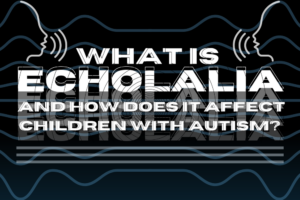
According to ancient Greek mythology, Echo was a mountain nymph cursed to only repeat back what was spoken to her. She was cursed by Hera, queen of the gods, after lying about the whereabouts of Hera’s husband, Zeus.
Later, Echo met Narcisus and fell hopelessly in love with him, yet she couldn’t act on her feelings, and their love was never meant to be.
Echo was doomed to watch Narcisus fall in love with himself and fade away to just a voice repeating the last words spoken to her.
This mythological story of Echo and Narcissus is where half the word echolalia comes from, the other half of the word meaning to repeat speech.
Echolalia: What Is It?
Echolalia is when someone repeats or echoes words, sounds, or sentences. This is a regular part of development for a child as they learn how to share their thoughts and ideas with those around them. But after about three-years-old, it may point to a developmental issue.
According to the National Library of Medicine, “Echolalia becomes less and less prominent as language skills develop. A disorder may be suspected if automatic speech imitation persists or reemerges after the age of three.”
Echolalia is one of the most common signs of autism spectrum disorder. A recent study backs this point further by indicating that “approximately 75% of verbal children with ASD engage in echolalia at some point in development.”
Why Do Children With Autism Engage in Echolalia

Below are a few reasons why a child with ASD might use echolalia.
-
Expressing Frustration – If a child with ASD becomes irritated by something in their environment, repeating certain words or phrases might be a way for them to express their frustration or stress.
-
Stimming – Children with ASD are often very sensitive to certain sounds or visual stimuli. When a child with autism becomes overstimulated, it often leads to self-stimulation (also called stimming), like rocking back and forth or echolalia.
-
Communication – Sometimes, a child with ASD might enjoy a type of game or see a specific type of food that they would like to eat. Repeating something that might not be directly related to joining a game or trying some food is their way of communicating their needs to others.
What are the Types of Echolalia?
There are two major types of echolalia: immediate echolalia and delayed echolalia.
Immediate echolalia means that a child with ASD repeats words right after they hear them spoken, while delayed echolalia is when a child with autism repeats words they had heard at an earlier time and often completely out of context.
Echolalia can also be classified based on the way a child with autism repeats another’s words. Mitigated echolalia is when the volume or tone of the repeated speech differs from how it was originally said.
“As the language and comprehension improve in children with autism, more mitigated echolalia may be observed. The child learns to make a change in the speech or intonation instead of repeating verbatim.”
The other form of echolalia based on the features of speech repetition is unmitigated echolalia. With unmitigated echolalia, the child with ASD repeats words or phrases exactly as they are said.
Echolalia Treatment Options
Instead of regarding echolalia as a negative behavior, we should think of it as a step toward effective communication. Regardless of what form of echolalia manifests, the earlier a child receives treatment, either through the help of a speech therapist or applied behavior analysis (ABA) therapy, the better chances there are for a child with ASD to communicate well with others.
ABA Therapy at Applied ABC
Whether it’s getting a better handle on communication or finding effective ways to express their needs to others, our family-first approach to ABA is personalized to meet your child’s exact needs by breaking down challenging life skills and goals into bite-sized pieces.

Through practice and repetition, your child can become more confident, independent, and social on their personal journey with autism.
Our flexible therapy options allow families to access our services in a variety of settings:
-
Home-based autism therapy
-
In-center treatment options*
-
In-school special education support
-
Social Skills Groups
*Center-based therapy only offered in select states
How to Start Receiving ABA Therapy Services
Getting started with Applied ABC is easy! As soon as you have an official autism diagnosis, we pair you with a local ABA provider who will work directly with your family.
Our process to start receiving ABA is simple; just follow the steps below:
1. Obtain an official autism diagnosis.
2. Fill out our Getting Started Application.
3. Provide medical and insurance information.
4. Relax; we’ll handle the rest!
Sources Cited
Patra, K., & Jesus, O. National Library of Medicine. Echolalia.
Santen, J. Qualifying Repetitive Speech in Autism Spectrum Disorders and Language Impairment.



